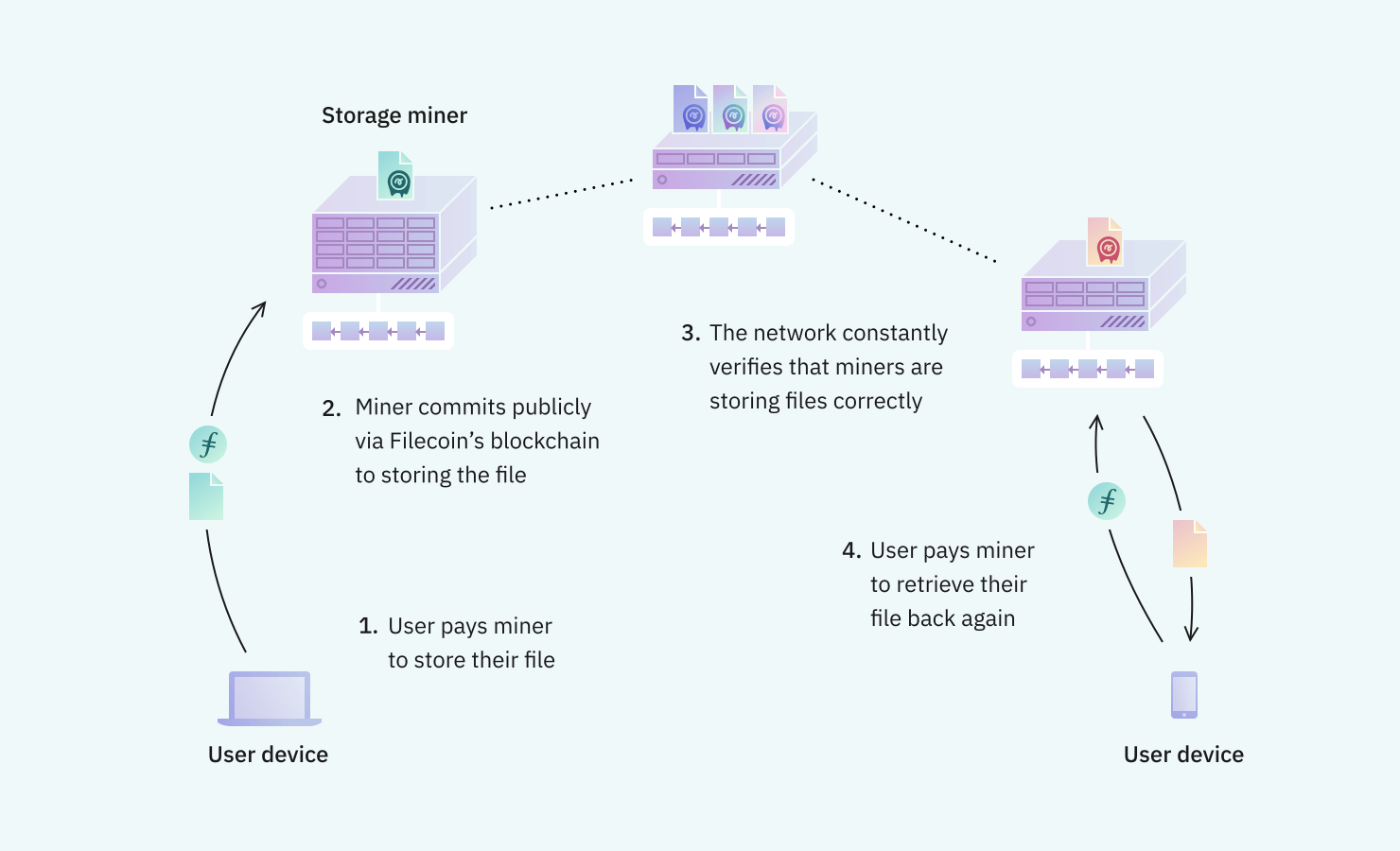
Is the S&P 500 Halal? A Guide for Muslim Investors
26 August 2025 7 min read

IW
IFG Staff Writers
6 min read
Last updated on:
Filecoin is a peer-to-peer storage system backed by blockchain technology. It wants to compete with centralised cloud storage companies such as Amazon Web Services by storing data in a decentralised manner. It aims to do this in a way that is more resilient, efficient and censorship-proof.
Think of Filecoin as the digital storage equivalent of Airbnb. Instead of renting out a room, you can rent storage space on your computer. As a blockchain that simply facilitates the storing of data in a decentralised manner, we believe Filecoin is halal.
Also read: What is Chainlink? Is it Halal?
Read on for a much deeper dive into Filecoin itself and the Islamic views on it.
Filecoin is a decentralised storage system. It was launched in August 2017 when its initial coin offering (ICO) raised $200m. Filecoin’s mission statement is to store information crucial to humanity.
Filecoin aims to achieve this by connecting users that want to store data with storage providers. It functions as a peer-to-peer marketplace underpinned by Filecoin’s blockchain and native token, FIL.
Filecoin achieves decentralisation by removing barriers to entry and promoting an open market. To become a storage provider, you require spare storage and an internet connection. Filecoin incentivises storage providers to reliably store files over time by rewarding them with units of FIL.
To understand how Filecoin works, you need to understand two types of deals: storage and retrieval deals.
A storage deal is an agreement to store data between a client and a storage provider. The storage provider needs to repeatedly prove to the network that it is storing the data in-line with the agreement. It is rewarded with FIL for doing so and penalised if it doesn’t.
Cryptographic proofs are used to verify that the data is being stored correctly. Filecoin uses Proof Of Replication (PoRep), to demonstrate that the data has been received and has a unique encoding. Once the deal is active, Proof of Spacetime (PoSt) is used to prove the data is still being stored. This is done through random spot checks by random storage providers. The proofs are recorded on the blockchain.
A retrieval deal is an agreement to retrieve stored data from the network. The retrieval provider doesn’t have to also be a storage provider. These deals are settled off-chain between clients and retrieval providers.
These deals are coordinated and paid for by Filecoin nodes who also maintain the network. The nodes are also responsible for validating messages in each block and syncing the blockchain. New blocks are mined to the blockchain every 30 seconds as storage providers execute deals in return for FIL.
The below diagram from Filecoin can summarise the process.

Its primary use case is to provide users and storage providers with an open market to buy and sell storage. It differentiates itself from its mainstream counterparts by emphasizing decentralised storage.
Instead of centralised entities such as Google and Amazon storing your data in specific locations, an open market would allow storage providers to store data from any location.
This it claims will lead to more efficient storage as the data is closer to the client. The data will also be more secure and censorship-resistant as there isn’t one central point of failure. Instead, the storage is distributed across the world limiting the impact of any single attack.
Filecoin has a total storage space of 17.5EiB, which has been going up daily by an average of 40 Pib over the past week.
An exbibyte (EiB) is a unit that represents data capacity which is approximately 1,152,921,504 gigabytes. These are quite large numbers, so let me put them into context. 1 exbibyte can store 4500 copies of Wikipedia or 290m 1080p movies.
Let’s also compare these figures to the rest of the market. It’s not easy to work out the total storage capacity of the entire Internet, so we have to rely on estimates.
According to the International Data Corporation (IDC), 64.2ZB of data was created or replicated in 2020. 1ZB is roughly equal to 867EiB. Therefore Filecoin could have captured 0.03% of this amount.
This is not an insignificant amount considering Filecoin has only been around for a few years. They are also competing against the giants in the space who have been around for much longer such as Google and Microsoft.
Filecoin (FIL) is one of the most established cryptocurrencies and currently is the 38th largest cryptocurrency with a market capitalization of ~$1.2bn. FIL can be bought from most exchanges including Coinbase and Binance. It reached a peak of $237.24 in April 2021 and is currently trading around $5.28 at the time of writing, having lost a whopping 98% of its peak value.
Filecoin is going head to head with genuine heavyweights. The storage market is dominated by the likes of Google, Microsoft, Amazon and even storage-only providers such as Dropbox. The competition in this market is fierce.
Filecoin’s unique selling point is the decentralisation that it offers. Having your data spread across multiple locations can make it more secure and censorship-resistant. However, it remains to be seen whether this is a key factor for most consumers.
BTFS is a file-sharing protocol that is part of the BitTorrent ecosystem. It allows users to easily and securely share files. BTFS is often used in the entertainment sector.
Initially, it was infamous for the distribution of pirated content but it is now increasingly being used to distribute officially licensed content. It is also used in the education, software and gaming sectors to share downloadable content.
Arweave is another popular decentralised storage network which officially launched in 2018. It allows you to permanently store data for a single upfront fee.
The protocol matches those that have available storage space with those that need to store data permanently. It has also created the ‘permaweb’, which it describes as a community-owned web where all of its content is permanent and decentralised.
When it comes to cryptocurrency in general, our view is that investing in crypto is halal as long as the project itself is halal. We see cryptocurrency as a type of digital asset (with the potential for some to become fully-fledged currencies).
We don’t find there to be anything problematic from an Islamic perspective about blockchain technology, and cryptocurrency which is a use of blockchain and seeking to profit from it. For more on our approach to crypto, check out this article.
You want to avoid projects where:
Filecoin connects users that want to store data with storage providers. There is nothing inherently impermissible in this and therefore we believe Filecoin is halal.
If you follow the opinion that crypto isn’t permissible, then Filecoin by extension would also not be permissible.
In summary, Filecoin is a decentralised storage system backed by blockchain technology. It aims to become the digital storage equivalent of Airbnb, by allowing anyone to rent out their spare storage space.
Filecoin wants to compete with the likes of Amazon and Google by tackling their weaknesses.
Namely, it wants to give users a more reliable, censorship-resistant and efficient storage option. However, it remains to be seen whether the market exists for such a product and if so, whether Filecoin is the right project to lead this new market.
We are satisfied that it is indeed a halal asset and thus permissible for Muslim investors to buy.

26 August 2025 7 min read

24 July 2025 15 min read

16 July 2025 5 min read
Leave a Reply